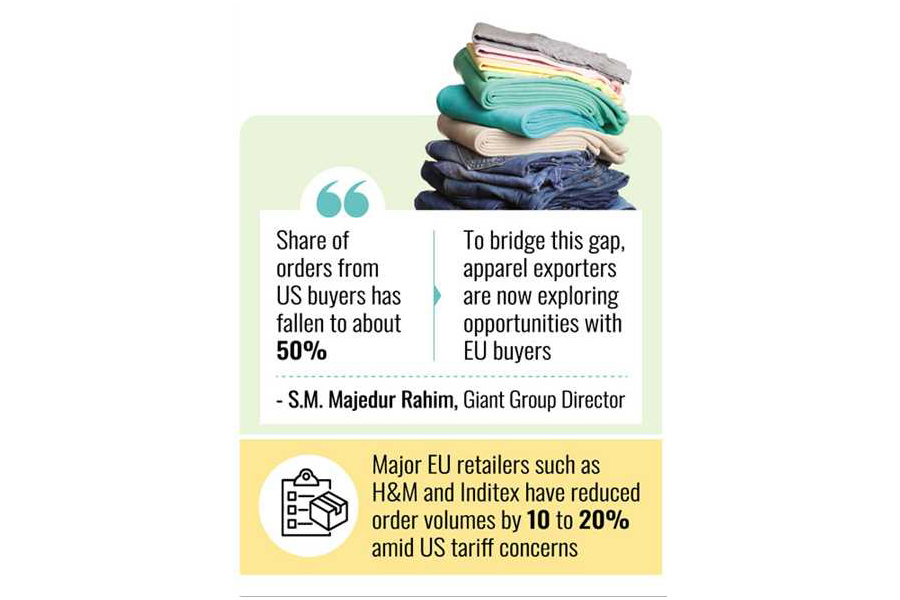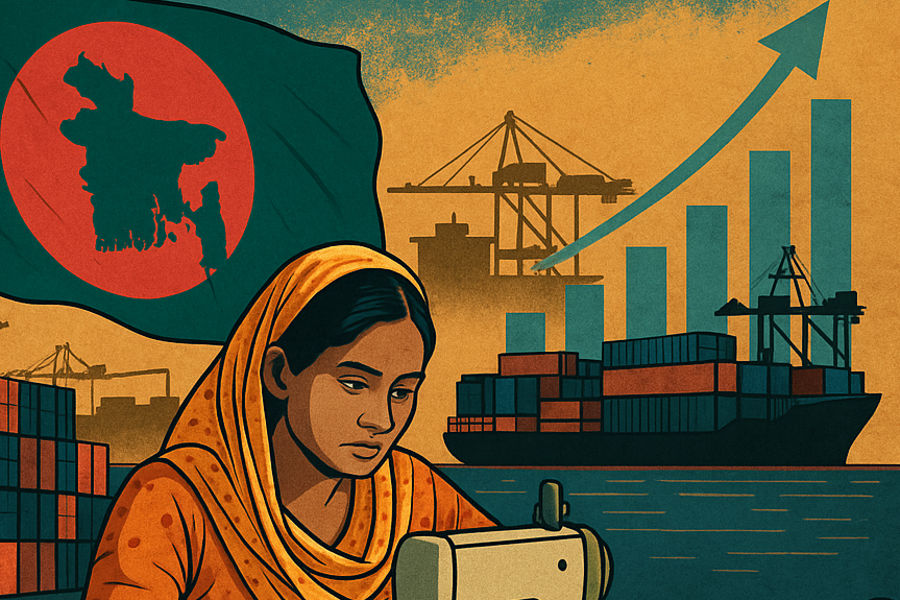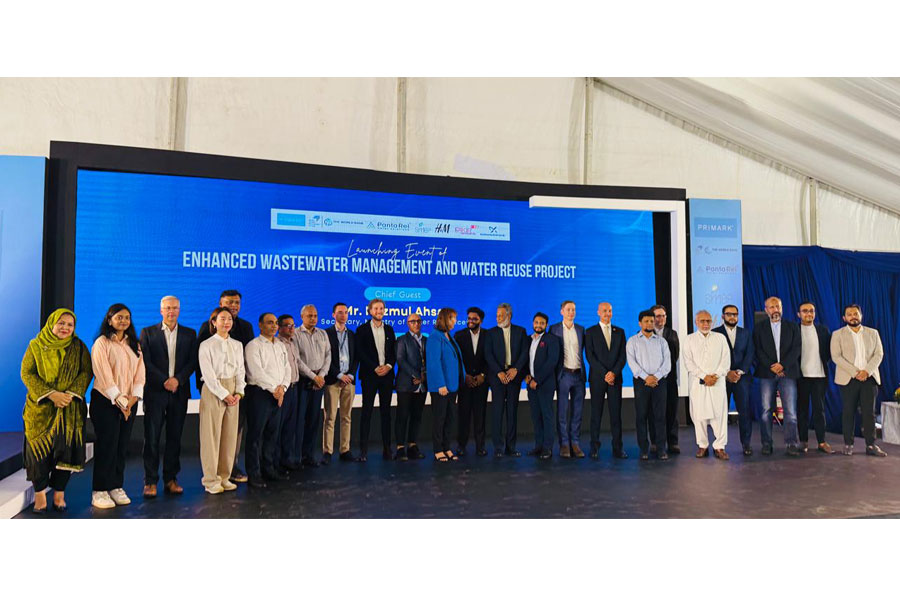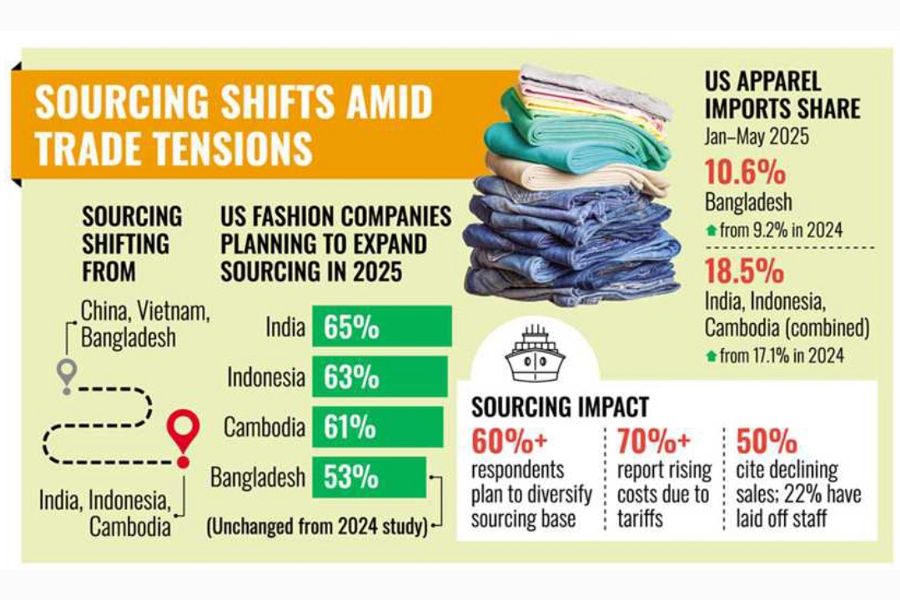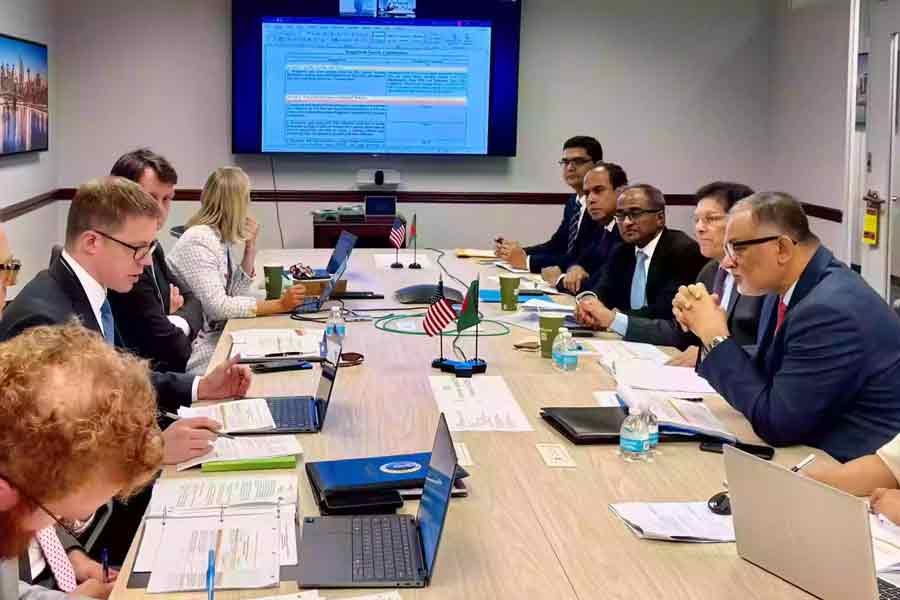Saif
Senior Member
- Joined
- Jan 24, 2024
- Messages
- 15,828
- Likes
- 7,967
- Nation

- Axis Group


Home textile exporters fear decline in purchase orders
Home textile exports rebounded slightly, but higher reciprocal tariffs in the US market and declining competitiveness worry Bangladeshi manufacturers about future order flow.
US reciprocal tariff
Home textile exporters fear decline in purchase orders
Shuvonkar KarmokarDhaka
Published: 19 Jul 2025, 08: 17

Over 90 per cent of the exports and imports take place though Chittagong Port. Prothom Alo
Home textile has long been among the top five export products of Bangladesh. After the Covid-19 fallout, the sector became the country’s second-largest export earner in 2021–22 fiscal year.
However, rising inflation due to the Russia-Ukraine war dealt a heavy blow to the industry, resulting in two consecutive years of declining exports. In the 2024–25 fiscal year, the sector showed a slight recovery.
According to the Export Promotion Bureau (EPB), Bangladesh exported home textile products worth USD 870 million in the last fiscal year, up by 2.42 per cent from the previous year.
Like the apparel sector, the United States remains the single largest market for home textile exports, accounting for nearly 17 per cent of total shipments last year.
The United States recently imposed an additional 35 per cent reciprocal tariff on Bangladeshi products, set to take effect from 1 August. This is on top of a 10 per cent reciprocal tariff already in place for goods from all countries since three months ago.
Negotiations are underway between Dhaka and Washington to reduce the new 35 per cent tariff.
Against the backdrop, home textile traders are fearing a significant drop in orders from the US market if the additional tariff is not slashed. According to them, Bangladesh has already lagged behind in home textile competitiveness due to different issues, including sharp increases in gas prices, and high-interest bank loans. Now, even a 5 per cent higher reciprocal tariff compared to competitors would bring down purchase orders from the US, which could ripple into the European market as well.
Home textile products include bed sheets, pillow covers, curtains, cushions, and terry towels.
Bangladesh currently exports these items to 131 countries, while the major markets are the US, India, Germany, France, the UK, and Canada. Although the sector has around 150 factories, only 50–60 are now exporting products. Even among operational units, many are struggling with low order volumes.
Shamsuddin Towels has been involved in home textile exports since 1990. Located in Feni BSCIC (Bangladesh Small and Cottage Industries Corporation), the factory has a monthly production capacity of 70 tonnes of towels. Due to a lack of orders, around 40 tonnes of its capacity remains idle each month.
“After the 10 per cent reciprocal tariff took effect in April, our US clients began reducing orders,” said Moinuddin Ahmed, the company’s managing director. “If the reciprocal tariff is not brought down from 35 per cent, we will have to remain satisfied with the EU market only.”
Following the pandemic, demand for home textiles surged. Bangladesh’s exports jumped from USD 760 million in 2019–20 fiscal year to USD 1.62 billion in FY 2021–22. But the Russia-Ukraine war reversed the momentum, and exports declined in FY 2022–23.
According to the EPB data, Bangladesh exported USD 150 million worth of home textile products to the US market in FY 2024–25.
Speaking to Prothom Alo, M Shahadat Hossain, former chairman of the Bangladesh Terry Towel and Linen Manufacturers and Exporters Association (BTTLMEA), said, “Last year, there was no export from my own factory for one month and 23 days due to gas shortage. The gas supply has slightly improved recently, but the reciprocal tariff issue now worries the businesses. If Bangladeshi goods face even a 2–3 per cent higher tariff than our competitors, our US exports will fall sharply.”
Home textile exporters fear decline in purchase orders
Shuvonkar KarmokarDhaka
Published: 19 Jul 2025, 08: 17
Over 90 per cent of the exports and imports take place though Chittagong Port. Prothom Alo
Home textile has long been among the top five export products of Bangladesh. After the Covid-19 fallout, the sector became the country’s second-largest export earner in 2021–22 fiscal year.
However, rising inflation due to the Russia-Ukraine war dealt a heavy blow to the industry, resulting in two consecutive years of declining exports. In the 2024–25 fiscal year, the sector showed a slight recovery.
According to the Export Promotion Bureau (EPB), Bangladesh exported home textile products worth USD 870 million in the last fiscal year, up by 2.42 per cent from the previous year.
Like the apparel sector, the United States remains the single largest market for home textile exports, accounting for nearly 17 per cent of total shipments last year.
The United States recently imposed an additional 35 per cent reciprocal tariff on Bangladeshi products, set to take effect from 1 August. This is on top of a 10 per cent reciprocal tariff already in place for goods from all countries since three months ago.
Negotiations are underway between Dhaka and Washington to reduce the new 35 per cent tariff.
Against the backdrop, home textile traders are fearing a significant drop in orders from the US market if the additional tariff is not slashed. According to them, Bangladesh has already lagged behind in home textile competitiveness due to different issues, including sharp increases in gas prices, and high-interest bank loans. Now, even a 5 per cent higher reciprocal tariff compared to competitors would bring down purchase orders from the US, which could ripple into the European market as well.
Home textile products include bed sheets, pillow covers, curtains, cushions, and terry towels.
Bangladesh currently exports these items to 131 countries, while the major markets are the US, India, Germany, France, the UK, and Canada. Although the sector has around 150 factories, only 50–60 are now exporting products. Even among operational units, many are struggling with low order volumes.
Shamsuddin Towels has been involved in home textile exports since 1990. Located in Feni BSCIC (Bangladesh Small and Cottage Industries Corporation), the factory has a monthly production capacity of 70 tonnes of towels. Due to a lack of orders, around 40 tonnes of its capacity remains idle each month.
“After the 10 per cent reciprocal tariff took effect in April, our US clients began reducing orders,” said Moinuddin Ahmed, the company’s managing director. “If the reciprocal tariff is not brought down from 35 per cent, we will have to remain satisfied with the EU market only.”
Following the pandemic, demand for home textiles surged. Bangladesh’s exports jumped from USD 760 million in 2019–20 fiscal year to USD 1.62 billion in FY 2021–22. But the Russia-Ukraine war reversed the momentum, and exports declined in FY 2022–23.
According to the EPB data, Bangladesh exported USD 150 million worth of home textile products to the US market in FY 2024–25.
Speaking to Prothom Alo, M Shahadat Hossain, former chairman of the Bangladesh Terry Towel and Linen Manufacturers and Exporters Association (BTTLMEA), said, “Last year, there was no export from my own factory for one month and 23 days due to gas shortage. The gas supply has slightly improved recently, but the reciprocal tariff issue now worries the businesses. If Bangladeshi goods face even a 2–3 per cent higher tariff than our competitors, our US exports will fall sharply.”




